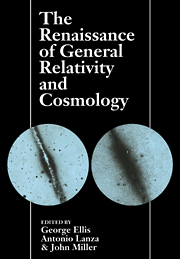 The Renaissance of General Relativity and Cosmology
The Renaissance of General Relativity and Cosmology Published online by Cambridge University Press: 15 December 2009
INTRODUCTION
Those of us who had the privilege of being Dennis Sciama's students during what Hajicek has described as ‘the Golden Age of General Relativity’ can trace many of the current concerns of the subject back to the ideas which he fostered, either directly or indirectly, within his research group in Cambridge. This was the environment in which major contributions to most of the foundational ideas about singularities: from the controversies about the steady state and big bang theories; through the critique of the early Lifshitz-Khalatnikov arguments which at first suggested that the big bang singularity was not generic, leading to definitions of just what constituted a singularity; to the Hawking-Penrose singularity theorems themselves. The issue of cosmic censorship stemmed naturally from this work, and illustrates well the combination of rigorous mathematics with a firm hold on physical relevance which he established at that time. In this talk I shall try to give an outline of the historical work on cosmic censorship, focussing at the end on my own recent work on shell crossing singularities. I shall not be concerned with what George Ellis, in this meeting, has termed the position of the goal posts — the details of exactly what the target is; rather, I shall be arguing that we should in fact be playing a different game.
To save this book to your Kindle, first ensure no-reply@cambridge.org is added to your Approved Personal Document E-mail List under your Personal Document Settings on the Manage Your Content and Devices page of your Amazon account. Then enter the ‘name’ part of your Kindle email address below. Find out more about saving to your Kindle.
Note you can select to save to either the @free.kindle.com or @kindle.com variations. ‘@free.kindle.com’ emails are free but can only be saved to your device when it is connected to wi-fi. ‘@kindle.com’ emails can be delivered even when you are not connected to wi-fi, but note that service fees apply.
Find out more about the Kindle Personal Document Service.
To save content items to your account, please confirm that you agree to abide by our usage policies. If this is the first time you use this feature, you will be asked to authorise Cambridge Core to connect with your account. Find out more about saving content to Dropbox.
To save content items to your account, please confirm that you agree to abide by our usage policies. If this is the first time you use this feature, you will be asked to authorise Cambridge Core to connect with your account. Find out more about saving content to Google Drive.